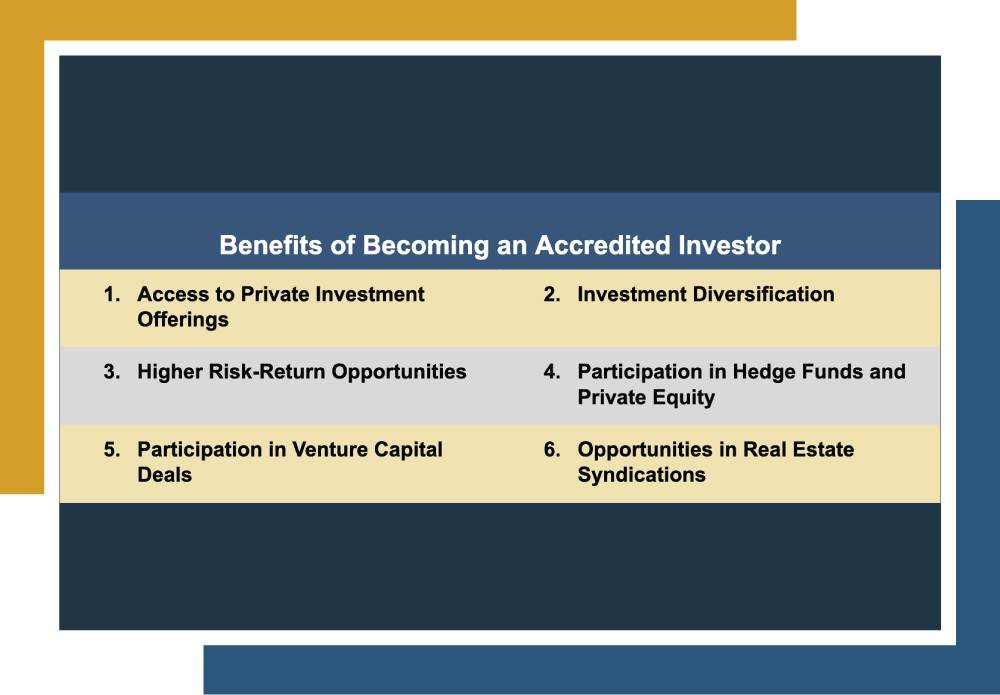All Categories
Featured
Table of Contents
- – First-Class Accredited Investor Financial Grow...
- – Exceptional Accredited Investor Investment Funds
- – All-In-One Private Placements For Accredited ...
- – Top-Rated Exclusive Investment Platforms For ...
- – High-Quality Accredited Investor Secured Inv...
- – Streamlined Accredited Investor Growth Oppor...
- – World-Class Private Placements For Accredite...

The policies for certified financiers vary among jurisdictions. In the U.S, the meaning of a certified capitalist is presented by the SEC in Policy 501 of Regulation D. To be a recognized financier, an individual has to have an annual earnings going beyond $200,000 ($300,000 for joint income) for the last two years with the expectation of earning the same or a higher income in the present year.
A recognized financier must have a web worth surpassing $1 million, either independently or collectively with a partner. This amount can not consist of a main house. The SEC additionally takes into consideration applicants to be recognized investors if they are general partners, executive police officers, or directors of a business that is issuing unregistered securities.
First-Class Accredited Investor Financial Growth Opportunities
Additionally, if an entity includes equity proprietors who are recognized financiers, the entity itself is a recognized investor. However, a company can not be created with the sole objective of purchasing particular safety and securities - accredited investor opportunities. An individual can certify as an approved capitalist by demonstrating enough education and learning or work experience in the financial market
Individuals who intend to be certified financiers don't relate to the SEC for the designation. Rather, it is the duty of the business offering an exclusive positioning to see to it that every one of those come close to are accredited financiers. Individuals or events who intend to be accredited financiers can approach the provider of the unregistered safety and securities.
For instance, mean there is a specific whose income was $150,000 for the last three years. They reported a main residence worth of $1 million (with a home loan of $200,000), a car worth $100,000 (with a superior funding of $50,000), a 401(k) account with $500,000, and an interest-bearing account with $450,000.
This person's internet worth is exactly $1 million. Because they fulfill the net worth demand, they qualify to be a certified investor.
Exceptional Accredited Investor Investment Funds

There are a couple of much less common credentials, such as handling a trust fund with more than $5 million in properties. Under government securities laws, just those who are accredited investors may take part in particular protections offerings. These might include shares in personal positionings, structured items, and private equity or bush funds, to name a few.
The regulators wish to be specific that participants in these very dangerous and intricate financial investments can take care of themselves and judge the threats in the absence of federal government defense. The recognized capitalist guidelines are designed to safeguard potential financiers with restricted economic knowledge from risky endeavors and losses they may be ill geared up to hold up against.
Accredited capitalists satisfy qualifications and professional requirements to access special investment chances. Designated by the U.S. Stocks and Exchange Commission (SEC), they obtain entrance to high-return alternatives such as hedge funds, equity capital, and exclusive equity. These investments bypass full SEC registration but carry greater threats. Approved investors should satisfy earnings and total assets needs, unlike non-accredited people, and can spend without constraints.
All-In-One Private Placements For Accredited Investors

Some vital adjustments made in 2020 by the SEC include:. Consisting of the Collection 7 Series 65, and Collection 82 licenses or various other qualifications that reveal monetary experience. This modification acknowledges that these entity types are commonly used for making investments. This adjustment recognizes the competence that these staff members establish.
This change accounts for the impacts of rising cost of living over time. These amendments expand the accredited financier pool by around 64 million Americans. This wider accessibility provides a lot more possibilities for investors, yet also increases prospective risks as much less economically advanced, financiers can get involved. Companies using personal offerings might take advantage of a larger swimming pool of potential capitalists.
These financial investment options are unique to certified investors and institutions that qualify as a recognized, per SEC laws. This gives certified capitalists the possibility to spend in emerging firms at a stage before they think about going public.
Top-Rated Exclusive Investment Platforms For Accredited Investors for Accredited Investor Platforms
They are checked out as financial investments and come just, to certified customers. In addition to recognized firms, qualified financiers can select to invest in start-ups and up-and-coming ventures. This supplies them tax obligation returns and the opportunity to get in at an earlier stage and potentially reap rewards if the firm thrives.
Nevertheless, for investors open to the dangers involved, backing start-ups can result in gains. Most of today's technology business such as Facebook, Uber and Airbnb originated as early-stage start-ups supported by accredited angel financiers. Advanced capitalists have the chance to explore financial investment options that might produce extra revenues than what public markets supply
High-Quality Accredited Investor Secured Investment Opportunities
Although returns are not assured, diversity and portfolio improvement options are increased for capitalists. By diversifying their profiles via these expanded financial investment methods recognized financiers can enhance their strategies and potentially achieve remarkable long-lasting returns with proper risk administration. Experienced capitalists frequently come across financial investment alternatives that might not be easily available to the basic capitalist.
Financial investment options and protections provided to accredited financiers typically entail higher threats. Private equity, venture funding and bush funds commonly focus on investing in assets that bring danger but can be sold off conveniently for the opportunity of higher returns on those dangerous financial investments. Investigating prior to investing is critical these in scenarios.
Lock up durations prevent investors from withdrawing funds for more months and years on end. Financiers may struggle to precisely value personal properties.
Streamlined Accredited Investor Growth Opportunities
This change may expand accredited investor status to a variety of individuals. Updating the revenue and property criteria for rising cost of living to ensure they show adjustments as time proceeds. The present limits have remained static since 1982. Permitting partners in committed connections to integrate their sources for common eligibility as certified capitalists.
Enabling people with certain expert qualifications, such as Series 7 or CFA, to certify as accredited investors. This would recognize monetary refinement. Producing added demands such as evidence of monetary literacy or effectively completing an accredited investor exam. This can make sure capitalists comprehend the threats. Restricting or eliminating the key house from the web well worth computation to reduce possibly filled with air analyses of riches.
On the other hand, it can additionally lead to knowledgeable capitalists thinking excessive risks that may not appropriate for them. So, safeguards may be needed. Existing recognized financiers may encounter raised competitors for the best investment opportunities if the swimming pool grows. Companies increasing funds may take advantage of a broadened certified investor base to draw from.
World-Class Private Placements For Accredited Investors
Those that are presently considered certified investors have to remain upgraded on any type of alterations to the standards and laws. Their qualification could be based on adjustments in the future. To maintain their standing as accredited financiers under a modified interpretation changes might be required in riches management techniques. Companies looking for recognized investors must remain vigilant about these updates to guarantee they are bring in the right target market of investors.
Table of Contents
- – First-Class Accredited Investor Financial Grow...
- – Exceptional Accredited Investor Investment Funds
- – All-In-One Private Placements For Accredited ...
- – Top-Rated Exclusive Investment Platforms For ...
- – High-Quality Accredited Investor Secured Inv...
- – Streamlined Accredited Investor Growth Oppor...
- – World-Class Private Placements For Accredite...
Latest Posts
Tax Lien Foreclosures For Sale
How Tax Lien Investing Works
Delinquent Tax Collector
More
Latest Posts
Tax Lien Foreclosures For Sale
How Tax Lien Investing Works
Delinquent Tax Collector